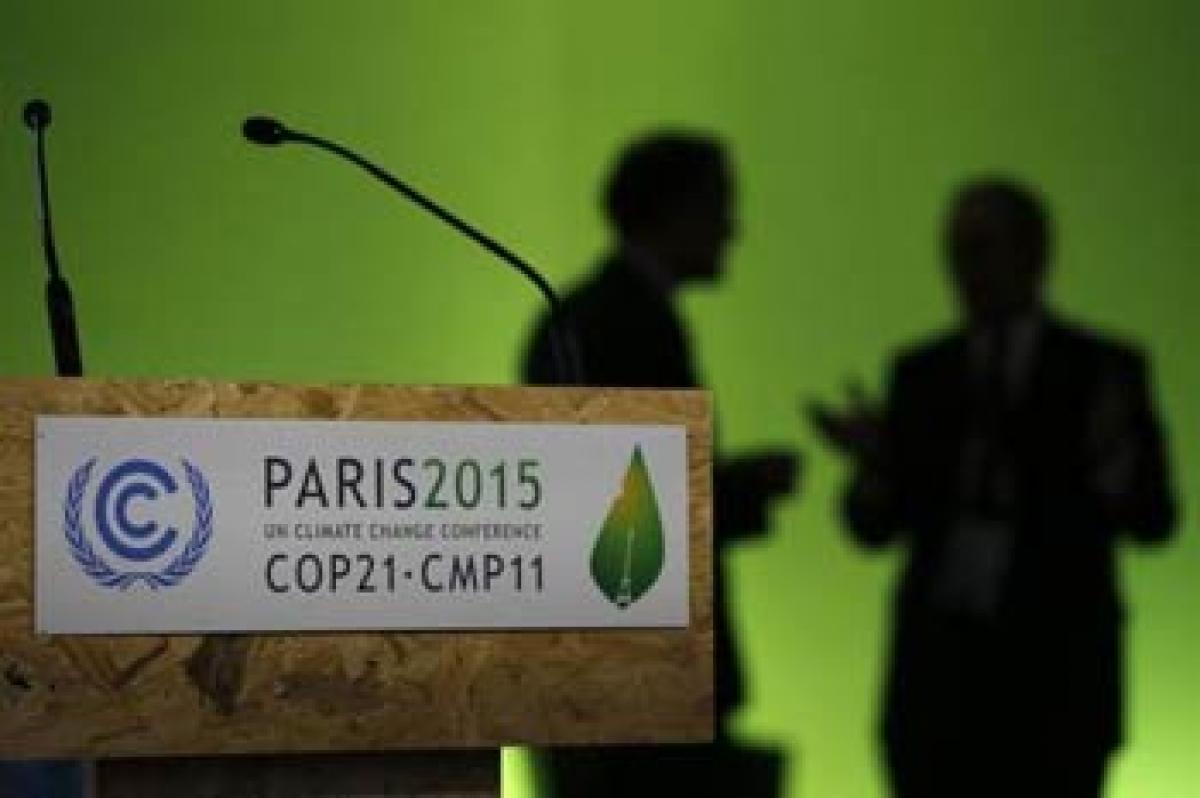Live
- Over 7,600 Syrians return from Turkiye in five days after Assad's downfall: minister
- Delhi BJP leaders stay overnight in 1,194 slum clusters
- Keerthy Suresh and Anthony Thattil Tie the Knot in a Christian Ceremony
- AAP, BJP making false promises to slum dwellers for votes: Delhi Congress
- 'Vere Level Office' Review: A Refreshing Take on Corporate Life with Humor and Heart
- Libya's oil company declares force majeure at key refinery following clashes
- Illegal Rohingyas: BJP seeks Assembly session to implement NRC in Delhi
- Philippines orders full evacuation amid possible volcanic re-eruption
- Government Prioritizes Welfare of the Poor, says Dola Sri Bala Veeranjaneyaswamy
- Two Russian oil tankers with 29 on board damaged due to bad weather
Just In

Global climate change talks in Paris moved into a new, tougher phase on Saturday as negotiators agreed to a draft accord that still leaves hundreds of points of dispute for ministers to resolve next week.
 Global climate change talks in Paris moved into a new, tougher phase on Saturday as negotiators agreed to a draft accord that still leaves hundreds of points of dispute for ministers to resolve next week.
Global climate change talks in Paris moved into a new, tougher phase on Saturday as negotiators agreed to a draft accord that still leaves hundreds of points of dispute for ministers to resolve next week.
While a largely procedural step in the four-year quest for a binding deal to slow global warming, the fact that senior government officials from almost 200 nations agreed on the draft marks an improvement over the last failed summit in Copenhagen six years ago, where no such text was even approved.
"This text marks the will of all to reach an agreement," Laurence Tubiana, French climate envoy, told delegates at the half-way point of the meeting lasting until Dec. 11. The top delegate from China, Su Wei, said the first week of the talks "though very difficult, have produced very good results and provide a strong foundation for next week."
Even so, the new text highlights the enormity of work that lies ahead for foreign ministers including U S Secretary of State John Kerry, who must find consensus on the most contentious issues that have bedevilled talks for four years.
Negotiators have left them 939 pieces of bracketed text representing the varying options for resolving points of disagreement. Some developing nations want to phase out fossil fuels by 2050, for instance, but China is among those preferring to promise merely to shift to a low-carbon economy this century.
An agreement at the U N summit on the outskirts of Paris is expected to represent by far the strongest global accord yet to commit both rich and developing nations to curbing the rise in greenhouse gas emissions widely blamed for climate change, although further action will be needed to avoid global temperatures rising beyond a dangerous threshold, officials say.
The agreement will not proscribe specific measures or targets, which are being undertaken at a national level. But it would create a legal framework on key issues such climate finance for developing nations, beyond a goal of $100 billion a year already set for 2020 and set a long-term goal for the shift from fossil fuels.
The text, running to 43 pages including a 21-page core agreement, leaves most of those issues to be worked out. "We had hoped that our work would be further advanced," said Nozipho Mxakato-Diseko of South Africa, who speaks on behalf of more than 130 developing nations. The fear is that the talks could end with a weak deal with so much work left.
Better than Copenhagen
Early this year, the text had been about 100 pages, roughly halved by the time the Paris summit began. The new draft is likely to be far shorter, with work set to intensify toward late next week as many nations hold out until the last possible moment to defend their key positions. The text marks progress since Copenhagen.
At that 2009 meeting, negotiators never even managed to approve such a formal draft to lay out the options. "The situation couldn't be more different from Copenhagen ... when delegations were more interested in grandstanding," said Richard Black, director of the Energy and Climate Intelligence unit think-tank.
He said the chances of a deal next week "now look pretty good." Many nations said the draft, the result of four years of work since the process was launched in Durban in 2011, leaves too much unresolved for a deal meant to chart ways to rein in rising greenhouse gases blamed for causing more floods, heat waves, droughts and rising sea levels.
Some developing nations said the new text showed a widening acceptance by rich nations to help them to cope with loss and damage from major impacts of climate change, such as hurricanes or sea level rise."Two years ago the discussion was whether loss and damage existed," Saint Lucia's Environment Minister James Fletcher said.
Now, he noted, options on loss and damage were part of the core draft text. All sides agree that promises for curbs on greenhouse gas emissions fall far short of action needed to limit global warming to a U N goal of 2 degrees Celsius (3.6F) above pre-industrial times.
By David Stanway and Richard Valdmanis

© 2024 Hyderabad Media House Limited/The Hans India. All rights reserved. Powered by hocalwire.com







